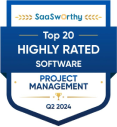A project without challenges is a myth. Something will fall out of place, and you need to do the brainwork to find a solution to get a project back on track. Many beginner project managers often misinterpret a project plan as a guarantee of success, but it only tries to increase the likelihood of the project’s success by making a manager ready to resolve challenges. Therefore, to deal with the project management challenges and craft comprehensive solutions, you need to know about the project management challenges.
In this chapter, we will examine the common project management problems a project manager faces and practical project management solutions to overcoming obstacles.
Most common challenges in project management for a project manager
A project manager primarily faces challenges in four directions while managing a project. First, related to the project itself, second, project key stakeholders or sponsors, third, project team, and fourth, related to self. Let’s explore the various challenges in each category.
Project related challenges
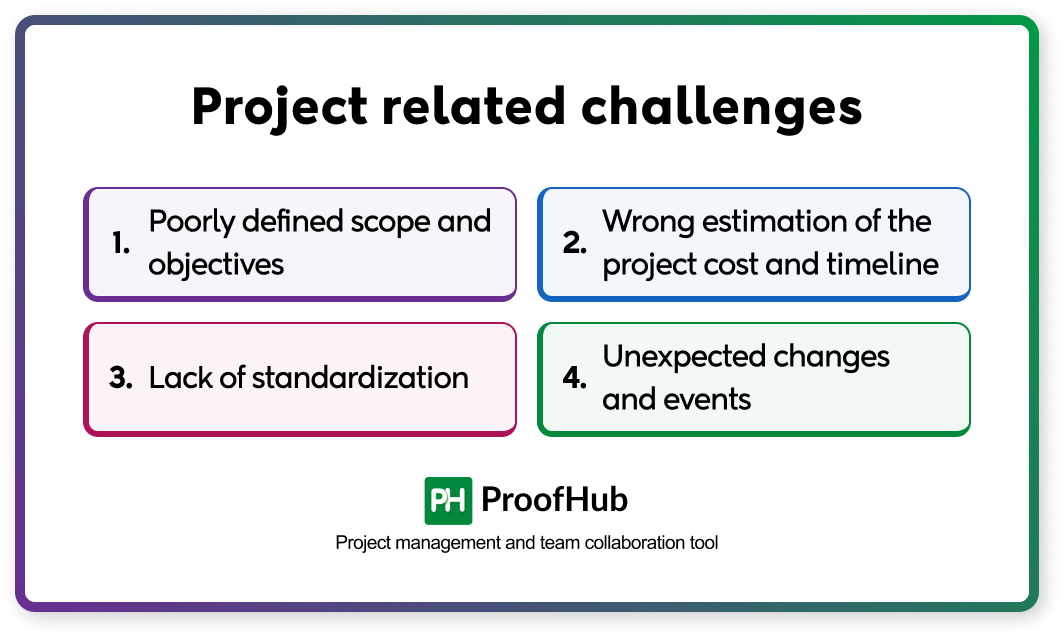
The first set of project management challenges a beginner project manager faces is related to the project itself. It includes four major challenges:
- Poorly defined scope and objectives
- Wrong estimation of the project cost and timeline
- Lack of standardization
- Unexpected changes and events
1. Poorly defined scope and objectives
This is one of the biggest reasons the project fails. It can happen due to various reasons: stakeholders not knowing what they want from the project, poorly mapped out stakeholders’ expectations, and lack of skills of a project manager to verbalize and objectify stakeholders’ needs into clear objectives.
This leads to a mismatch between the project’s key stakeholders’ expectations and project deliverables, resulting in project failure.
How to solve:
The best way to resolve this type of challenge is to clearly define the project’s scope. To do so, there are certain things you can do:
- Interview stakeholders to gain clarity on project requirements.
- Use the SMART framework to write project objectives and goals.
- Get approval from the stakeholders on defined and documented objectives.
- Clearly describe the project objectives to the team in a kick-off meeting.
- Create a shared understanding with standardized documents and processes such as project management plans and performance metrics.
2. Wrong estimation of the estimated cost and timeline
Another big mistake beginner project managers make is either overestimating or underestimating the resources required for a project task. By resources, we mean everything from time to cost to human, equipment, and technology.
How to solve:
To counter this challenge, the best way is to use estimation techniques. The most popular techniques used for the estimation are:
- Bottom-up estimation: It sums up the individual task costs to get the total estimate. This is a detailed estimation technique that calculates the cost of each project component or activity individually. These detailed costs are then aggregated to determine the total project cost.
- Analogous estimation: It uses historical data from similar projects to estimate costs and time and make adjustments for differences in scale, complexity, or timing.
- Three-point estimation: It estimates the cost of a task or activity using three scenarios: Optimistic (O), Most likely (M), and Pessimistic (P).
- Expert judgment: It leverages the knowledge and experience of subject-matter experts to estimate cost and time.
- Parametric estimation: It uses statistical relationships between variables (e.g., cost per unit, cost per square foot) to calculate costs.
Frameworks like Work Breakdown Structure (WBS) help you decompose the major project deliverables into small parts such as tasks and sub-tasks. You can make calculations to estimate the cost, time, and other resources at the lowest level of the WBS to make accurate estimates. And tools like the Gantt chart help you map the entire project plan and its timeline.
Map the entire work breakdown structure of the project with ProofHub Gantt chart software.
3. Lack of standardization
The next biggest trouble for a project manager is the lack of standardized processes for performing project management activities. This leads to inconsistent results and makes it difficult to handle unexpected changes.
For example, a lack of standardized processes to deal with changes in scope leads to scope creep and makes it impossible to complete a project within budget and time due to changes in the work.
How to solve:
To deal with this, you need to create a standardized change management process that allows you to secure time, cost, and resources for the project to complete a project in a revised timeline.
Similarly, you need to create standardized frameworks for everything such as:
- Standard metrics to measure project progress and team performance.
- Standard frameworks like the RACI matrix to define the roles.
- Standard workflow for quality management and project operations.
- Standard project management methodologies like Kanban, Agile, and Waterfall for the management of project activities.
4. Unexpected changes and risks
Certain project risks cannot be predicted or controlled, such as unplanned resource shortages, technical issues, or external disruptions. These are among the biggest challenges for a project manager and can lead to delays or even project failure.
How to solve:
- Develop flexible plans that can adapt to changing circumstances.
- Reserve sufficient contingency resources in the form of funds and time.
- Monitor risks throughout the project and adapt the project plan as necessary.
- Regularly review and update project plans to reflect the latest developments.
- Staying within budget can be tough, especially when dealing with unforeseen costs or underestimating expenses during planning.
Team related challenges
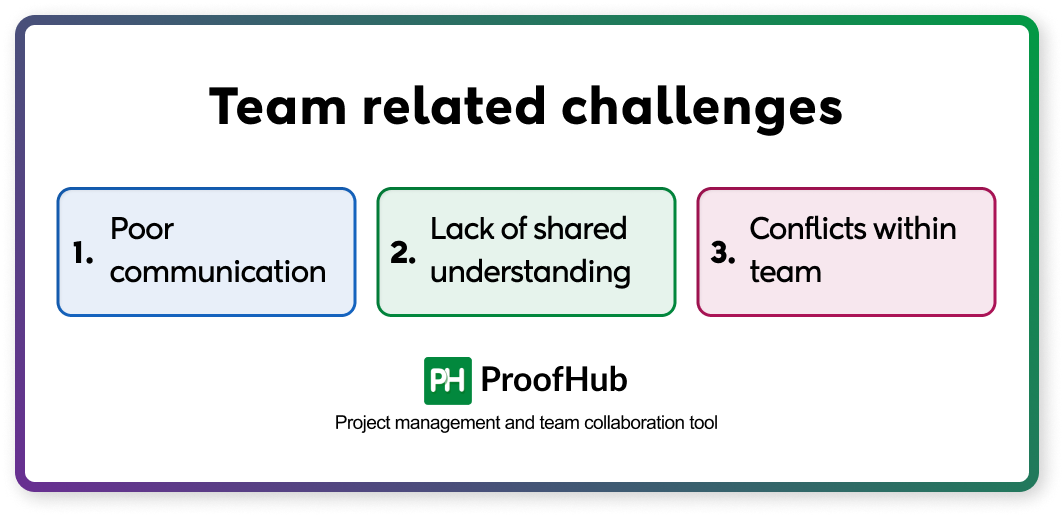
The second direction of challenges a project manager faces is related to the team. Poor communication is one of the biggest challenges, followed by a lack of shared understanding and conflict between team members. Let’s explore these challenges and how to solve them.
1. Poor communication
Poor communication is the biggest challenge a project manager faces. It can occur for various reasons, such as a lack of standardized communication channels, guidelines, or tools.
How to solve:
- Clarify the roles and responsibilities of each team member.
- Use standard frameworks like SMART, RACI, and flowcharts to define the roles and responsibilities.
- Establish standard channels of communication and norms and guidelines for communication.
- Choose easy-to-use digital collaboration tools and train and encourage the use of tools.
- Involve team members in the project’s decision-making and gather inputs before committing or deciding on something.
2. Lack of shared understanding
This is one of the biggest challenges that can hamper a team’s ability to work together effectively. It happens when a project team does not have a standardized way to work together.
How to solve:
Use standard artifacts, documents, and metrics to create a shared understanding and bring everyone on the same page.
3. Conflicts within team
Conflicts within a team can occur for various reasons, such as different personalities, working styles, and attitudes. If a team is not managed appropriately, it can lead to poor teamwork, information withholding, and ineffective communication.
How to solve:
- Create a culture of open communication and feedback to resolve team conflicts immediately.
- Use standard, ethical, and moral practices for a fair code of conduct with team members.
Stakeholder-related challenges
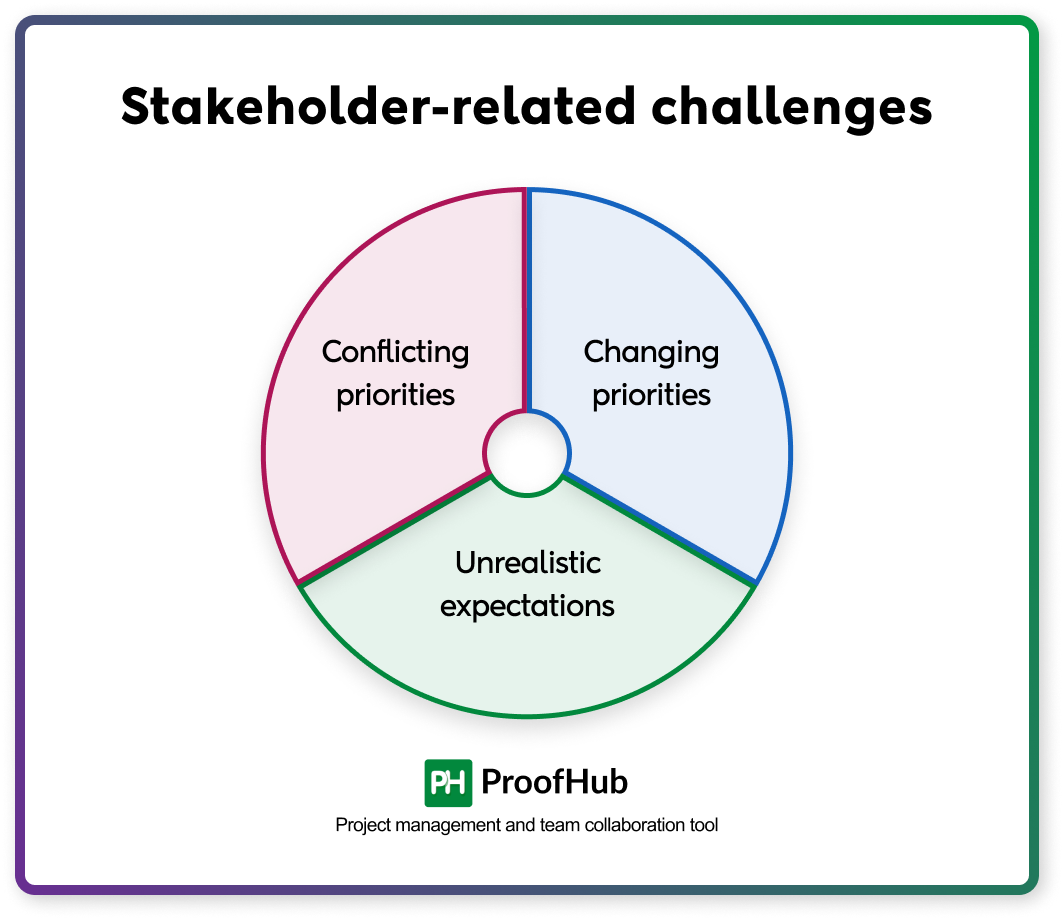
Another challenge a project manager faces is misaligning stakeholders’ expectations with the project direction. This can happen for various reasons, such as changing priorities, unrealistic expectations, and conflicting priorities. It eventually leads to the stakeholders’ lack of interest and buy-in in a project, which can eventually impact the flow of funds to the project.
Unhappy and disappointed stakeholders may delay decisions, create additional obstacles to the project, or withdraw support, leading to project failure.
How to solve:
To resolve this issue, it is important to manage stakeholders’ expectations.
- Balancing the needs of multiple stakeholders while staying true to project objectives.
- Identify key stakeholders and understand their expectations early on.
- Maintain regular communication and transparency about progress and challenges.
- Use negotiation and conflict resolution techniques to address disagreements.
Challenges related to self
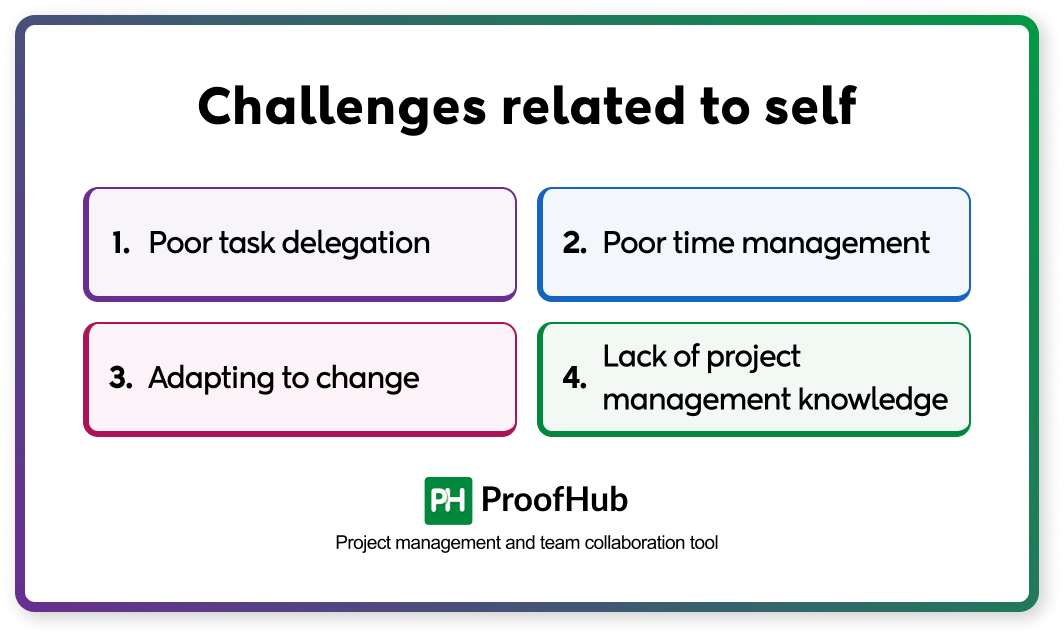
The next set of challenges a beginner project manager has to go through is related to a project manager’s skills. Most managers are not able to recognize and accept this even way along in their careers because it is related personally to them. But if left unresolved, it can impact the project’s success and your ability to manage a team. Common challenges included in this category are:
1. Poor task delegation
Poor task delegation is the biggest problem for managers. More than 70% of managers say they are not good at task delegation. This can be due to a lack of trust in team members, an inability to let go of control, perfectionist attitudes, and a lack of observation and communication skills. This leads to poor delegation, and managers tend to micromanage, which wastes a lot of time and creates unnecessary resistance.
How to solve:
To deal with this issue, project managers can practice the art of delegation.
- Use the Eisenhower matrix to delegate tasks.
- Involve team members while delegating tasks.
- Ask about the strengths and weaknesses of team members before delegating tasks.
- Provide oversight and support but let go of the tendency to control and micromanage.
2. Poor time management
This is another issue that can not only impact a manager’s individual performance but also the project in the form of missing deadlines and the project team’s overburdening. Poor time management means a manager is not able to utilize time efficiently and struggles to meet the tasks on their plate. This also leads to poor resource management and an inability to manage project deadlines effectively. Thus, the team will either be under-utilized or over-utilized. Thus, either not optimized or burnt out respectively. Thus, it impacts both the project team and the project.
How to solve:
- A manager can use the time management techniques to improve the time management. The most popular time management techniques include time boxing, task batching, and the ABC priority method.
- Seek advice from managers, mentors, and online communities when facing complex problems.
3. Adapting to change
This is one of the challenges that even experienced managers find it difficult to tackle. Even the approved changes in the project plan are difficult to handle because you need to find new ways of working and revisit the project plan. A manager who relies on perfection and following a well-established project plan finds it challenging to manage changes to the project scope, schedule, or resources. A manager needs a flexible mindset to deal with the dynamic nature of the projects. Resistance to change can also come from the team or stakeholders. Thus, change is hard to adapt to.
How to solve:
- Keep your mindset flexible and embrace change.
- Communicate the benefits of the changes clearly and consistently.
- Do not show resistance as it can slow down project implementation and reduce the overall effectiveness.
4. Lack of project management knowledge
Lack of knowledge of the advanced concepts of project management often causes issues for project management. Beginner managers find it difficult to choose the right concept to implement to manage the project activities. They make decisions accidentally which sometimes work and sometimes do not.
How to solve:
To resolve this, a project manager needs to build and enhance the knowledge of project management.
- Study online learning resources.
- Enroll in a certification course training program to understand widely used methodologies such as Agile, Scrum, and Waterfall.
- Practice project management with small projects and take time to learn and practice using tools like ProofHub, Jira, or Microsoft Project.
- Seek mentorship or guidance from experienced colleagues.
Some additional suggestions to overcome these challenges
There are certain additional things you can do to overcome these challenges. Have a look at a few suggestions.
- Proactive planning: Do not see the original plan as something that cannot be updated. Update your project plan as the needs of the project change. Invest in proactive planning and risk management to mitigate uncertainties.
- Emphasize communication: Proactively engage with your team to align them on the project objectives and stakeholders to ensure shared understanding.
- Be adaptable: Be ready to revise plans and strategies as circumstances change.
- Learn continuously: Invest in ongoing learning to improve your technical and leadership skills.
- Stay organized: Use project management tools like ProofHub to keep track of tasks, deadlines, and responsibilities.
Manage project challenges with ease using ProofHub
The purpose of project management is to balance scope, time, cost, and quality and it is a constant challenge for a project manager. The project manager worries about delivering the agreed outcomes without exceeding budget, falling behind schedule, or compromising quality.
Project management software comes to the rescue in doing so. Here is a brief explanation of how ProofHub can help you manage project challenges:
- Clearly define scope: ProofHub provides a centralized discussion board for all the stakeholders to participate in the project discussions and clearly define the scope of the project. It keeps a record of all the discussions and makes it easy to gather all the project requirements.
- Centralized task management: ProofHub allows you to create a project and break it into small parts with a centralized task management platform. This makes it easy to estimate the cost, time, and resources of each task in detail and track the progress.
- Visualize the project plan on Gantt chart: ProofHub comes with an in-built Gantt chart software that helps you visualize the project plan, dependencies, and milestones on the timeline. You can compare the actual project progress with the planned project progress to make key decisions.
- Facilitate collaboration: ProofHub provides a centralized and transparent platform for team collaboration. All the project work and project communication are facilitated in a single place. This makes it easy to resolve conflicts.
- Engage stakeholders with custom access: With ProofHub custom access, you can onboard project sponsors or clients on a project. This ensures transparency, builds trust, and allows stakeholders to view project progress and make project-related decisions with clarity.
By preparing for these challenges and adopting proactive strategies, you’ll build confidence and become a more effective project manager over time.


